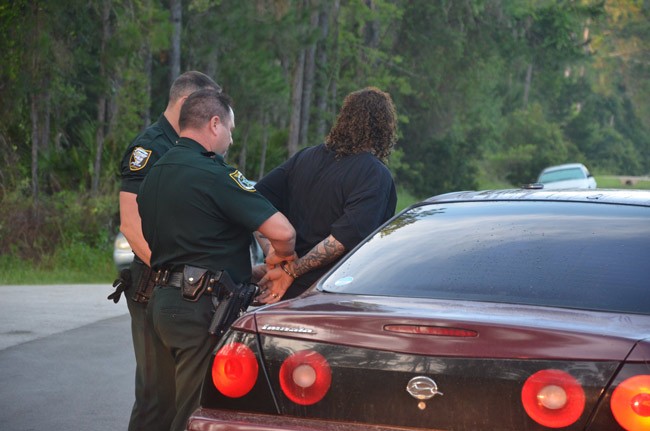
It started with a seat belt violation.
Keith Johnson was driving his Toyota on U.S. 1 just south of Old Dixie Highway. A Flagler County Sheriff’s deputy noticed the violation and pulled him over. Johnson acknowledged not wearing the seat belt and claimed he was just returning the car to a rental agency. As he talked with a deputy, a K-9 unit was summoned, and the dog sniffed out the presence of drugs. A search of the car produced a “crack cookie” weighing 25 grams—and $1,090 in cash on Johnson himself.
Johnson was arrested and charged with possession of cocaine with intent to sell. The cash was seized from Johnson, who would later be found guilty—not of cocaine possession, not of intending to sell cocaine, but of possession of a controlled substance. So the case was never made against him that the cash had been the result of a crime. Johnson was sentenced to four years’ probation. (Probation was terminated early last month, as the initial arrest dates back to 2013).
No matter. The sheriff’s office proceeded with its intention to keep the cash months before Johnson’s case was resolved, though not quite fast enough: it had missed the 45-day deadline set in law by almost 30 days. Suspects will often not fight such forfeiture proceedings. Johnson did. He hired an attorney and disputed the seizure: the filing for the assets was late, he argued, and the affidavit the sheriff’s office filed lacked proper documentation.
A week after Johnson filed his motion against the seizure, the sheriff’s office dropped the case.
For others, it doesn’t end up that way. Property and cash are seized, and the proceeds end up in the sheriff’s pot of so-called “civil asset forfeitures,” to be dispensed as grants to local charities, clubs, afterschool programs or, at times, to buy bullet-proof vests and other equipment for the sheriff’s office.
Johnson’s case was relatively straightforward: at least the forfeiture was the result of an arrest, though the conviction was for a significantly lesser offense than he was arrested for, and supposition, common sense or prejudice aside (Johnson is black), the state never proved the link between Johnson’s cash and crime. But there was nothing illegal, improper or out of the ordinary either in his arrest or in the sheriff’s seizure of the cash, or its attempt to keep possession of it.
Such arrests and seizures are common, though in Flagler County the sheriff says seizures don’t happen without an arrest, as they do elsewhere.
Cash and property could be forfeited on the mere suspicion of crime.
“I monitor it very closely with my attorney and we make sure that the things we’re seizing and forfeiting are appropriate,” Flagler County Sheriff Jim Manfre said. “And the dollars that we receive are spent almost exclusively for charitable purposes.”
Forfeiture without an arrest will soon be illegal in Florida. Gov. Rick Scott is expected to sign a new law that significantly reforms civil asset forfeiture, making Florida the third state in the nation to reform a controversial and often unjust practice that disproportionately targets the poor and minorities. Manfre was behind the reform law, as was the state’s sheriff’s association.
“Listening to the national conversation about civil forfeiture I do believe that most agencies comply and use it in the right way,” he said, “but there are certain agencies throughout the country and the state of Florida who do abuse the process, and the spirit of the law.”
“Civil asset forfeiture” is one of those complicated-sounding legal terms that obscures a sinister but simple police power: it allows a law enforcement agency to seize cash and any property, including homes, cars, boats or planes, suspected, not proven, to be involved in criminal activity. Under federal and Florida law, the cash and property may be seized even absent an arrest or criminal charges. The Drug Policy Alliance estimates that 80 percent of all such seizures take place without charges being filed or an arrest being made. The system also turns the criminal justice formula on its head, determining the property owner guilty of having used the property for crime until he or she proves otherwise.
The assets are forfeited, ending up in the inventory of the agency that seizes them as little more than slush funds that can then be spent or dispensed at will. There are no reliable figures on total state and local police funds collected through forfeiture. In Flagler County, Sheriff Jim Manfre says, it’s in the tens of thousands of dollars a year. Federally, the fund, as of 2013, stood at a record $4.2 billion, which local agencies could tap into through a program called Equitable Sharing.

Last year, New Mexico and Montana became the first states to ban asset forfeiture without an arrest. Earlier this month, the Florida House and Senate unanimously passed similar reform.
In Florida, agencies must follow rules to ultimately take possession of seized assets, including circuit court filings that give suspects an opportunity to contest the seizure.
“There’s always been a process,” Manfre said. “The simple issue is that for indigent defendants, they do not have the wherewithal to fight or be properly notified of these types of hearings, so it really requires a system to treat them fairly in order to make sure they get an adequate day in court as those who are represented by counsel.”
The new law makes arrest a condition of any asset seizure. The agency must then spend at least 90 days “diligently” searching for the property owner whose assets may be seized, ensuring that the owner has a chance to present a defense. A court will declare assets forfeited only when the owner has been prosecuted and has been found guilty (or pleaded no contest or guilty).
In addition, the head of the police agency seizing assets must review each forfeiture case—making the agency head accountable—and nothing in the process can influence the promotion or compensation of cops, so that going after forfeitures doesn’t become an incentive. The new law also sets out policy, training and reporting requirements, including the submission of annual reports to the Florida Department of Law Enforcement, due every October 10, documenting what was seized and what was spent. FDLE, in turn, must submit an annual report of statewide activity to the Office of Program Policy Analysis and Government Accountability.
“This bill sends a powerful message to Floridians: the government cannot seize your property without making an arrest,” Sen. Jeff Brandes, the Pinellas County Republican who championed the bill, said in a statement when it passed. “These sweeping reforms to civil forfeiture institute major consumer protections and prevent abuses against the property rights of Floridians. I hope the Governor will join both houses of the Florida legislature and support these critical reforms by signing this bill into law.”
“What this allows us to do,” Manfre said, “is monitor how asset forfeiture is being utilized throughout the state so we can identify those agencies that are not using it properly, or the state can, and we can rectify the situation.”
![]()





























Back Off says
1939…Nazi Germany would confiscate property and the execute anyone who was against Hitler or jewish. Tail light out….is that prescription meds ( legally prescribed ) in your car ? Lose your car…lose your money….lose your freedom !!!
Heil America
Joe says
So why did they call a k9 for a seat belt violation? Isn’t the law that police cant make you wait on site for a k9? It’s about time they started fixing the law, cops have been stealing money forever.
just saying says
Firstly, the civil asset forfeiture is just that, it’s a civil action. The Law Enforcement agency is suing the person for the property/currency. The standard for the judge to side with the Agency is much lower for civil ligation, it is only the preponderance of evidence. For criminal cases, the State has to prove beyond a reasonable doubt.
Second, the preponderance of evidence is much lower bar to reach. In the story, the defendant had 28g of cocaine and a sizable amount of cash. For the Judge to award the cash to the agency, the agency just needs to show the defendant had the drugs, and that the most likely reason he had that much drugs was he was selling it and thus had currency that was the proceeds of the illegal distribution. The criminal case would be a very different level. First, the cocaine would have to tested, the defendant would have to be shown in possession of it, that it was not only more than likely but that the only reason to have that much cash and drugs was for selling it. The agency charges the highest charge available, the SAO reduces the charges to make the strongest case to elicit a plea deal.
It really is apples to oranges. I do agree though about the concept of the defendant having to prove his innocence, that isn’t the way it should be although it is the way the legal (civil) system works.
Anonymous says
anyone that knows what happened in Nassau county new York knows about precients like the 5th precient using asset forfeiture wrongly
a sinlge dui case that the plaintiff won opened the doors to Grumman airport and allowed all the wrongly accused to retrieve the vehicles the county had been seizing for years-the county was already under investigation and had no idea that a single court case where the accused proved undeniably that he was wrongfully arrested-and his vehicle impounded with the officers caught lieing on the stand would lead to the outcome
in the end it was made law that if you are arrested for something like a dwi or even drug charges-you will be able to keep your vehicle until the end of the court proceedings-if found guilty you will then have to forfeit the vehicle–if the vehicle is sold during that time you owe the county the blue book value of that vehicle
they now film movies on the old Bethpage Grumman air field where the corrupt county kept all those cars
Jim Bob says
I bet most of the folks who approve this tactic claim they support the Constitution.